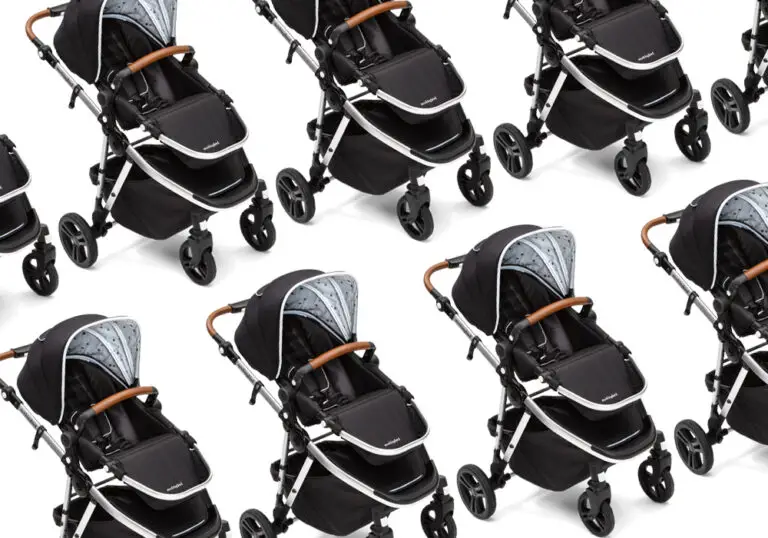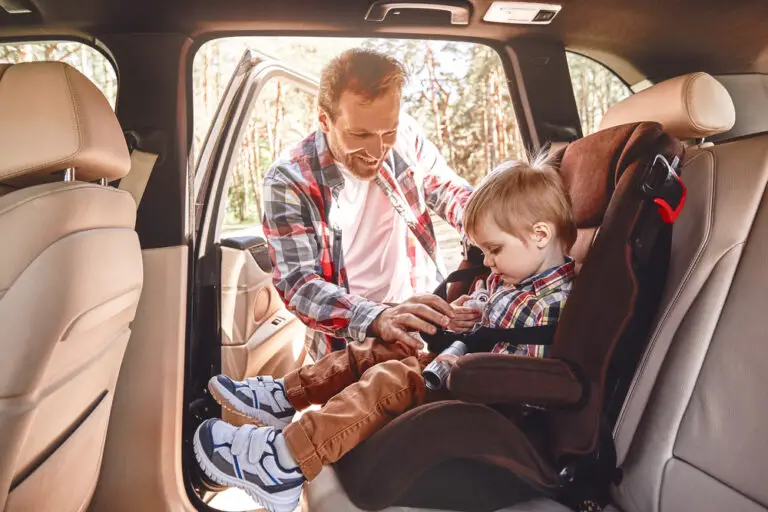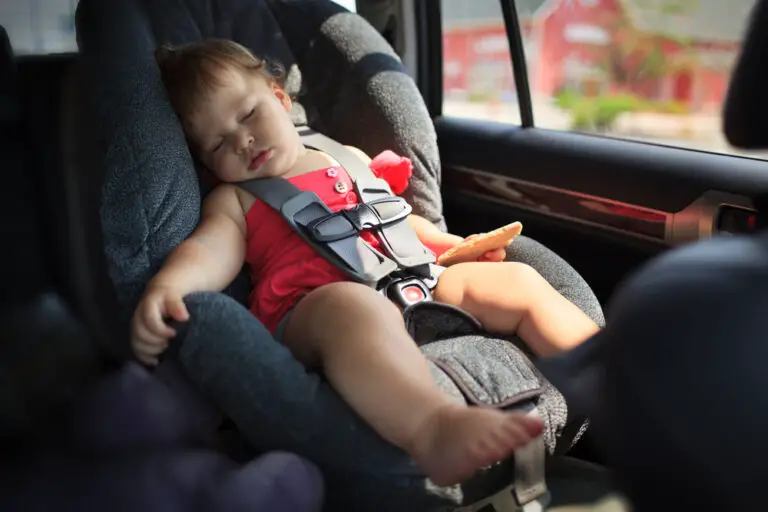Washington Car Seat Laws 2024 (Rear, Forward & Booster)

Under Washington car seat laws, a child less than 16 years of age must be secured in an appropriate child restraint.
Depending on their age, these restraints can be rear-facing, forward-facing, booster seat, or seat belt. A violation constitutes a traffic infraction. It carries a fine of a maximum $250.
Disclaimer: This content does not constitute legal advice. It is solely for informational purposes. Always check the original source of the law for the latest version.
- Rear-Facing
- Forward-Facing
- Booster
- Front Seat
- Seat Belt
- Taxi Seat
- Ridesharing Seat
- Replacement
- Alone in Car
- Choosing a Seat
- Installation Help
Washington Car Seat Laws
Washington Rear-Facing Car Seat Law
According to the rear-facing car seat law in Washington, an infant under the age of 2 years must be properly secured in a rear-facing car seat. (1) The seat must never be placed in front of an active airbag.
The rear-facing car seat age in Washington is 2 years. However, children should continue riding rear-facing until they reach the height and weight limits of the seat as set by the manufacturer.
A violation of Washington rear-facing child seat law is a traffic infraction. The maximum penalty is $250. (2) The driver will be held responsible.
If they can provide proof within 7 days that they have acquired a federally-approved rear-facing seat and do not have a previous car seat violation, the court can dismiss the infraction.
Age: Newborn to 2 years
Penalty: Maximum $250
Washington Forward-Facing Car Seat Law
According to the forward-facing car seat law in Washington, children between the ages of 2 to 4 years should ride in a forward-facing car seat with a harness if they have outgrown their rear-facing seat. (1)
They should use the forward-facing seat till they exceed its height and weight limits prescribed by the manufacturer.
The forward-facing car seat age in Washington is 2 to 4 years. But children should stay in their seat till they exceed their limits.
Disobeying the Washington forward-facing child seat law will be considered a traffic infraction. It can result in a fine of up to $250. (2) The driver will have to pay if they fail to show proof of purchasing a car seat within 7 days of getting notice.
Age: 2 years to 4 years
Penalty: Maximum $250
Washington Booster Seat Law
According to the child booster seat law in Washington, a child older than 4 years and shorter than 4 feet 9 inches who has surpassed the weight and height limits of their forward-facing seat must be secured in a booster seat. (1)
It can be a high back or a backless booster seat. It must comply with the standards of the US Department of Transportation.
The booster seat age in Washington is not specific. But children should continue to ride in booster seats till the vehicle lap and shoulder belts fit them properly. This typically occurs between the ages of 8 to 12 years during which time the child reaches the height of 4’9”.
A violation of Washington booster seat requirements carries a maximum fine of $250. (2)
Age: Older than 4 years
Height: 4’9” or taller
Penalty: Maximum $250
Washington Child Front Seat Law
According to the child front seat law in Washington, a child under 13 years of age should ride in the backseat of the vehicle. (1) They must be secured in an appropriate and federally approved car seat.
The front seat age in Washington is 13 years, which is in line with the recommendations of the American Academy of Pediatrics.
If there are more children than can be safely buckled in the backseat, a child can ride in the front seat in a car seat that is appropriate for their height and weight.
However, the seat must be moved as far away from the dashboard as possible.
Under the Washington car seat regulations, the driver will be held responsible for a violation of these requirements. The maximum fine is $250. (2)
Age: 13+ years
Penalty: Maximum $250
Washington Child Seat Belt Law
According to the child seat belt law in Washington, all children under 16 years of age who are at least 4’9” tall must wear an adult safety belt. (3) The belt must be properly fastened around the child’s body. This is compulsory, regardless of whether they are traveling in the backseat or the front seat.
Violation of seat belt rules in Washington is a traffic infraction. The maximum penalty for not wearing a seat belt carries a fine of $250. (2)
The requirements under Washington children’s seat belt law do not apply to an occupant if all seating positions with a seatbelt are occupied. They also do not apply if the driver or passenger is unable to wear a seatbelt due to physical or medical reasons.
Age: Under 16 years
Height: 4’9” or taller
Penalty: Maximum $250
Washington Taxi Child Seat Law
According to the taxi child seat law in Washington, taxis are not required to have car seats. Washington child seat laws require all children shorter than 4’9” to be safely secured in a car seat. (1) Vehicles that are for hire are exempt from this. Since taxis fall in this category, they are not required to have a car seat for a child passenger.
Even though there is no legal requirement to have a taxi child seat in Washington, you should not travel with your child without one. Ideally, you should arrange a car seat for your child before traveling with them in a taxi.
The seat must be federally approved and installed according to the manufacturer’s instructions. You can ask the taxi driver for help with installation.
Washington Ridesharing Child Seat Law
There is no specific ridesharing child seat law in Washington. Car seat laws in Washington require all children under 16 years of age to be secured in a child restraint or seat belt. (1)
Under Washington state law, vehicles for hire are exempt from having child seats. However, ridesharing services such as Uber and Lyft are not considered for hire vehicles. (3) In this scenario, the driver may be held liable for not having a child seat. The penalty can go up to $250. (2)
To be safe, drivers should carry a car seat. An all-in-one car seat may be the best option as it can convert to any type of car seat. As caregivers, you should inquire beforehand if the car has a child seat. If not, you should arrange for one before traveling.
Washington Child Seat Replacement Law
There is no definite child seat replacement law in Washington. However, the National Highway Traffic Safety Administration (NHTSA) recommends that the child safety seat be replaced after an accident.
If your vehicle is involved in a moderate or severe accident in Washington, you must replace the car seat. It must never be used again. However, there is no need to replace it after a low-impact accident. What qualifies as a low-impact crash can be determined with the help of these questions.
Apart from child seat replacement after an accident, you must also replace the seat if it has surpassed its expiry date. You can refer to the car seat manual to check how long the manufacturer recommends its usage. You should also replace the seat if it was recalled.
Leaving Child in the Car in Washington
According to the law on leaving a child in a vehicle in Washington, leaving a child under the age of 16 years unattended in a car, whether parked or with the motor running, is unlawful. (4)
The person operating or in charge of the vehicle will be held guilty of misdemeanor. A second or subsequent conviction will lead to a revocation of their license.
Leaving a child unattended in a vehicle is dangerous. They can be kidnapped, have an in-car accident or set the car in motion. One of the major concerns is the accumulation of excessive temperatures within the vehicle. This may cause the child to suffer from a heat stroke.
If the child is harmed, the offender can face stricter legal consequences for leaving a child in the car in Washington.
Choosing a Child Car Seat in Washington
Child passenger safety seats in Washington must meet the federal standards of the US Department of Transportation. Therefore, when choosing a car seat in Washington, you must ensure that the seat is federally approved.
For infants less than 2 years old, a rear-facing seat is the best car seat to use in Washington. When they outgrow their rear-facing seats, they should be placed in a forward-facing car seat.
If your child is shorter than 4’9” and has outgrown the forward-facing seat, they can move to a booster seat. A high-back or backless booster seat is the best booster seat to use in Washington.
Car Seat Installation Help in Washington
As per the child seat requirements in Washington, a car seat must be installed according to the instructions prescribed by the manufacturer.
It is generally installed using either the lower anchors or the seat belt. You may find the process complex.
Once you have installed the seat, you should get it checked by a certified child passenger safety (CPS) technician. Some stations in Washington where you can get your car seat checked or installed are:
- Seattle Children’s Safety and Injury Prevention
- Safe Kids Benton-Franklin Health District
- City of Everett
- Safe Kids DC
- Tumwater Fire Department
- City of Stanwood
Washington Car Seat Safety Resources
- Washington Traffic Safety Commission: The commission’s website includes information about different kinds of car seats and general guidelines to use them.
- Target Zero- Child Passenger Safety Program: The official Child Passenger Safety Program of the state, it has vital resources on everything related to car seats and applicable laws.
- District Department of Transportation: The Car Safety Seat Program of Washington DC provides residents with free car seats and resources about their proper use.
- King County, WA: It contains resources on Washington’s child passenger restraint law and what car seats to use.
- Seattle Children’s: A pediatric hospital and research institution, it also provides information and resources on child booster seats.
FAQ
How long should a child ride in a rear-facing car seat in Washington?
Under Washington law, a child must ride in a rear-facing car seat till they turn 2 years old or outgrow the limits of their rear-facing seat.
Can you put a rear-facing car seat in the front seat in Washington?
No, you cannot put a rear-facing car seat in the front seat. All children under the age of 13 should be properly restrained in the backseat.
Can you put a rear-facing car seat in the middle rear seat in Washington?
You can put a rear-facing car seat in the middle rear seat but it should fit properly. You should check your vehicle’s as well as the car seat’s manual.
When can a baby face forward in a car seat in Washington?
A baby can face forward in a car seat when they are older than 2 years and have outgrown the limits of their rear-facing car seat.
How old for a booster seat in Washington?
Children older than 4 years and who have outgrown their forward-facing seats can ride in booster seats. They should continue in booster seats till they are 4’9” tall.
When to use a backless booster seat in Washington?
You can use a backless booster seat only if your vehicle seat has a head rest and the child’s ears are not higher than the seat back.
When can a child sit in the front seat in Washington?
A child can sit in the front seat after they turn 13 years old. The adult seat belt should fit safely across their lap and shoulders.
When can a child sit in the front seat with a booster in Washington?
Ideally, children in a booster should ride at the back. You can put a booster seat in front if it is not practical to place it in the backseat.
When can a child stop using a booster seat in Washington?
Under the car seat laws in Washington, a child can stop using a booster seat when they are at least 4’9” tall and can properly wear the seatbelt.
When to switch from a 5 point harness to a seat belt in Washington?
When the child has outgrown their forward-facing seat with a 5 point harness, they can wear a seat belt in a belt-positioning booster seat.
When can a child use a regular seat belt in Washington?
As per the law, children under 16 years of age can wear a seat belt if they are at least 4’9” tall and are not physically or medically exempt.
Do you need a car seat in a taxi in Washington?
No, taxis in Washington are not required to have car seats as vehicles for hire are exempt from the law. But parents/caregivers can carry a federally approved car seat.
Do you need a car seat in a Uber in Washington?
Ridesharing services are not exempt under the ‘for hire’ vehicles category. The driver may be held responsible for not having a federally approved and appropriate car seat.
Do you need a car seat in a Lyft in Washington?
Ridesharing services are not exempt under the ‘for hire’ vehicles category. The driver may be held responsible for not having a federally approved and appropriate car seat.

Rishima Rawat
Rishima Rawat is a lawyer and legal writer with over six years of writing and legal experience. She earned her LLB degree from the West Bengal National University of Juridical Sciences, Kolkata. With a passion for child safety, she’s written extensively about the U.S. car seat laws in ParentingMode. She collaborates with businesses and law firms globally, enhancing their online content. Her insights are also published in legal journals like RGNUL, NLIU, and RMLNLU Law Review. Committed to the cause of education, she has volunteered with IDIA, which helps underprivileged children in India to access legal education. She has also worked with Enhelion Knowledge Ventures, a leading legal ed-tech platform in India that provides students with affordable courses in law. Fluent in English and Hindi with elementary proficiency in Spanish, Rishima combines her legal expertise with a dedication to child safety.






